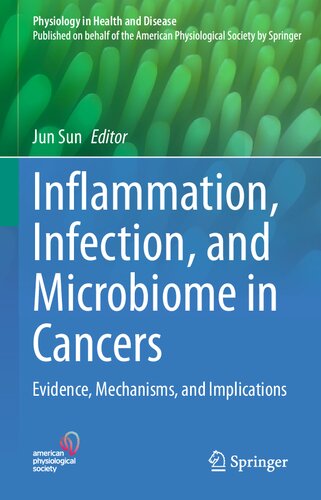Inflammation, Infection, and Microbiome in Cancers: Evidence, Mechanisms, and Implications 2021
دانلود کتاب پزشکی التهاب، عفونت و میکروبیوم در سرطان: شواهد، مکانیسمها و پیامدها
| نویسنده |
Jun Sun |
|---|
| تعداد صفحهها |
509 |
|---|---|
| نوع فایل |
|
| حجم |
9 Mb |
| سال انتشار |
2021 |
89,000 تومان
این کتاب خلاصه و بحثی در مورد ایجاد التهاب و عفونت در انواع مختلف سرطان ارائه می دهد. نویسندگان عفونتهای ویروسی که به طور سنتی در سرطان شناخته میشوند، نقشهای جدید سایر پاتوژنها (مانند باکتریها و قارچها)، و همچنین نشانگرهای زیستی برای تشخیص و درمان را پوشش میدهند. علاوه بر این، فصل ها پیشرفت ایمونوتراپی و سلول های بنیادی و نقش میکروبیوم در پاتوفیزیولوژی سرطان را برجسته می کنند.
خوانندگان بینشی در مورد جوامع میکروبی پیچیده ای که در بیشتر سطوح خارجی انسان زندگی می کنند و نقش مهمی در سلامت و بیماری دارند، به دست خواهند آورد. اختلال در تعاملات میکروب میزبان اغلب منجر به تغییر پاسخ میزبان می شود که می تواند باعث پیشرفت سرطان شود. بنابراین، این کتاب نقش های نوظهور میکروبیوم در پاتوژنز سرطان و نتایج درمان را برجسته می کند. تمرکز بر مفاهیم مکانیکی است که زیربنای روابط پیچیده میزبان و میکروب است. رویکردهایی که می توانند از عفونت جلوگیری کنند، التهاب مزمن را سرکوب کنند، و دیس باکتریوز را معکوس کنند، به عنوان ابزاری برای بازگرداندن تعادل بین میزبان و میکروبیوتا، مورد بحث قرار می گیرند.
این کار جامع برای محققان و دانشجویان علاقه مند به بیماری های عفونی، میکروبیوم، و سرطان، و همچنین پزشکان و فیزیولوژیست های عمومی مورد علاقه خواهد بود.
This book offers a summary and discussion of the advances of inflammation and infection in various cancers. The authors cover the classically known virus infections in cancer, novel roles of other pathogens (e.g. bacteria and fungi), as well as biomarkers for diagnosis and therapy. Further, the chapters highlight the progress of immune therapy, stem cells and the role of the microbiome in the pathophysiology of cancers.
Readers will gain insights into complex microbial communities, that inhabit most external human surfaces and play a key role in health and disease. Perturbations of host-microbe interactions often lead to altered host responses that can promote cancer development. Thus, this book highlights emerging roles of the microbiome in pathogenesis of cancers and outcome of therapy. The focus is on mechanistic concepts that underlie the complex relationships between host and microbes. Approaches that can inhibit infection, suppress chronic inflammation and reverse the dysbiosis are discussed, as a means for restoring the balance between host and microbes.
This comprehensive work will be beneficial to researchers and students interested in infectious diseases, microbiome, and cancer as well as clinicians and general physiologists.




